牛津高一英语必修全套教案
- 格式:doc
- 大小:49.00 KB
- 文档页数:26
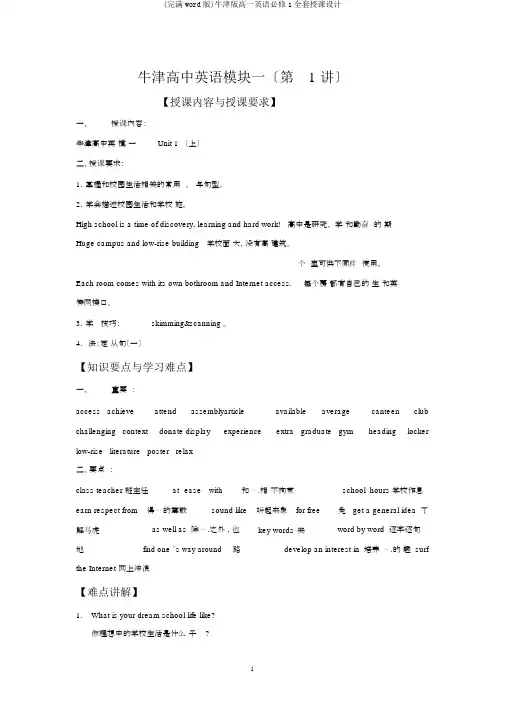
牛津高中英语模块一〔第 1 讲〕【授课内容与授课要求】一、授课内容:牛津高中英模一Unit 1〔上〕二、授课要求:1.掌握和校园生活相关的常用、与句型。
2.学会描述校园生活和学校施。
High school is a time of discovery, learning and hard work!高中是研究、学和勤奋的期Huge campus and low-rise building学校面大,没有高建筑。
个室可供不同样使用。
Each room comes with its own bothroom and Internet access.每个房都有自己的生和英特网接口。
3.学技巧:skimming&scanning 。
4.法:定从句〔一〕【知识要点与学习难点】一、重要:access achieve attend assemblyarticle available average canteen club challenging context donate display experience extra graduate gym heading locker low-rise literature poster relax二、要点:class teacher 班主任at ease with和⋯ .相不拘束school hours 学校作息earn respect from得⋯ 的尊敬sound like听起来象for free免 get a general idea 了解马虎as well as 除⋯ .之外 , 也key words关word by word 逐字逐句地find one ’s way around路develop an interest in 培养⋯ .的趣 surf the Internet 网上冲浪【难点讲解】1.What is your dream school life like?你理想中的学校生活是什么子 ?里dream 表示心目中最理想的. 如 dream team (梦之 )。
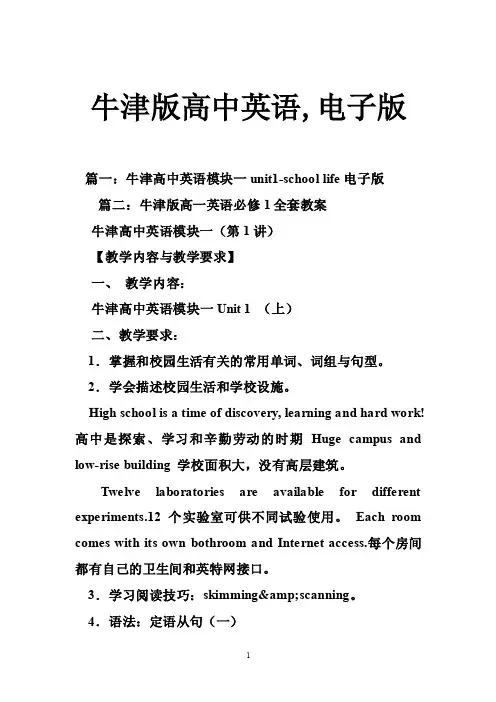
牛津版高中英语,电子版篇一:牛津高中英语模块一unit1-school life电子版篇二:牛津版高一英语必修1全套教案牛津高中英语模块一(第1讲)【教学内容与教学要求】一、教学内容:牛津高中英语模块一Unit 1 (上)二、教学要求:1.掌握和校园生活有关的常用单词、词组与句型。
2.学会描述校园生活和学校设施。
High school is a time of discovery, learning and hard work!高中是探索、学习和辛勤劳动的时期Huge campus and low-rise building 学校面积大,没有高层建筑。
Twelve laboratories are available for different experiments.12个实验室可供不同试验使用。
Each room comes with its own bothroom and Internet access.每个房间都有自己的卫生间和英特网接口。
3.学习阅读技巧:skimming&scanning。
4.语法:定语从句(一)【知识重点与学习难点】一、重要单词:access achieve attend assembly article available averagecanteen club challenging context donate display experience extra graduate gym heading locker low-rise literature poster relax二、重点词组:class teacher 班主任at ease with 和….相处不拘束school hours学校作息时间earn respect from 赢得…的尊敬sound like听起来象for free 免费get a general idea 了解大意as well as 除….以外, 也key words 关键词word by word 逐字逐句地find one’s way around 认识路develop an interest in 培养对….的兴趣surf the Internet网上冲浪【难点讲解】1. What is your dream school life like?你理想中的学校生活是什么样子?这里dream 表示心目中最理想的. 如dream team (梦之队)。
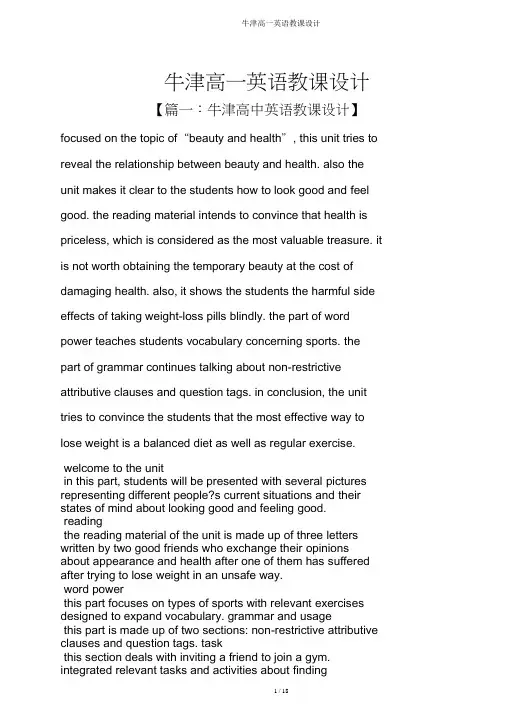
牛津高一英语教课设计【篇一:牛津高中英语教课设计】focused on the topic of“beauty and health”, this unit tries to reveal the relationship between beauty and health. also the unit makes it clear to the students how to look good and feel good. the reading material intends to convince that health is priceless, which is considered as the most valuable treasure. it is not worth obtaining the temporary beauty at the cost of damaging health. also, it shows the students the harmful side effects of taking weight-loss pills blindly. the part of word power teaches students vocabulary concerning sports. the part of grammar continues talking about non-restrictive attributive clauses and question tags. in conclusion, the unit tries to convince the students that the most effective way to lose weight is a balanced diet as well as regular exercise.welcome to the unitin this part, students will be presented with several pictures representing different people?s current situations and their states of mind about looking good and feeling good.readingthe reading material of the unit is made up of three letters written by two good friends who exchange their opinions about appearance and health after one of them has suffered after trying to lose weight in an unsafe way.word powerthis part focuses on types of sports with relevant exercises designed to expand vocabulary. grammar and usagethis part is made up of two sections: non-restrictive attributive clauses and question tags. taskthis section deals with inviting a friend to join a gym. integrated relevant tasks and activities about findinginformation about a gym and recommending one to a friend by note-taking and writing an e-mail are presented.projectin this part, understanding how to keep health and fit, and making a booklet about fitness is the main assignment.self-assessmentthe self-assessment section at the end of the unit aims toallow the students to determine what they have achieved, andwhat else they can do to improve their study.课时安排period 1 welcome to the unitperiods 2-3 reading period 4word powerperiods 5-6 grammar and usageperiods 7-8 task periods 9-10projectperiod 1 welcome to the unit整体设计教材剖析this unit presents the topic of“beauty and health”. beauty isan eternal theme. the whole unit tries to reveal the dialectical relationship between beauty and health and various ways ofkeeping healthy as well as beautiful.“welcome to the unit”isthe introduction to the unit, which discusses the topic“beautyand health”. the“welcome to the unit”part is composed offour pictures showing four common but effective ways to look good and keep good at the same time. in this section, some pictures describing people?s current situations and their opinions on looking good and feeling good are presented for the students to think about and discuss. following the four pictures are three questions for students to discuss. these three questions are so designed that students are able to share with each other their knowledge and ideas concerning the topic in the unit“looking good, feeing goodn this”wa.yi,students are well prepared for the further study later in the unit.in this part, students are expected to express their own opinions by comparing the importance of beauty and health inorder to practice their spoken english. considering thefunction and features of“welcome to the unit”, this part is usuallydesigned as a speaking lesson. generally speaking,teachers are supposed to put forward more questions besidesthe ones in the text book so that students are able to have afree discussioncentered on the topic“beauty and health”.三维目标1. encourage the students to discuss about the essence of beauty and how to make them more attractive.2. make the students to pay attention to their health and work out their own idea of living an ideal life.3. arose their interest in learning this unit through activities. and convince them that the real beauty is based on health.4. encourage the students to express their own ideas by meanings of pair work and class discussing and debating.5. help the students to learn to talk about various ways to keep one looking good and feeling good.6. learn some important words and expressions make me look slimmer, feel strong, get enough sleep to stay/remain healthy, an other way to stay slim(print out these words and expressions and hand them out to the students. the students are supposed to get familiar with these words and expressions before coming into the unit. )7. learn some key sentence patternswhat do you think of beauty and health, which is more important?do you think looking good is as important as feeling good?in your opinion, how a person can both look good and feel good?要点难点1. the students are supposed to express their own ideas by comparing the importance of beauty and health.2. the students are encouraged to carry out a debate and competition about what is beauty and how to become beautiful.3. ask the students to collect some information about audrey hepburn, princess diana, christopher reeve and david beckham and get ready for the discussion before class.教课方法1. discussion in pairs or in groups.2. task-based in-class activities.3. explanations of some language points.教具准备a tape recorder and the multimedia课前准备1. ask the students to prepare for a free-talk for about two or three minutes on the following topic: what is beauty? thestudents may have various opinions on the topic. encourage them to form a proper idea on the real meaning of beauty, which obviously contains not only physical beauty but also spiritual beauty as well. if the students can realize that the eternal beauty comes inside from the person, they will not try to lose weight blindly.2. they are supposed to search for the information in the library or on the internet about four famous people: the film star audrey hepburn, the football player david beckham, princess diana and the legend actor who once acted as the superman so that they can carry out a brainstorming about the four people in the class.3. divide the whole class into several groups, with four to six students in a group so that they can share what they have found and their ideas.教课过程in the new english textbook, many activities have been designed on the basis of a coordination of topic,function andstructure. by means of taking part in all kinds oflanguageactivities, students have more opportunities to improvetheirability of using simple english to express their feelingsandideas towards different problems. in this way, studentsaresupposed to develop receptive ability includinglistening andreading skills as well as productive ability includingspeakingand writing skills. in terms of the“welcome to theunit”part,emphasis is usually focused on the training of speaking ability,which is basically in the form of task-based teaching methods,such as discussion in pairs or groups, oral presentation, debate and so on. all the activities should be centeredonstudents and be used to develop their skills of both independent thinking and cooperative communication.→step 1 lead-inof the song on the blackboard and ask the student to listenand sing together). an english song might be an enjoyable start of a lesson of welcome to the unit, which can help the students to have a better understanding of beauty. also, ifthe students in the class are to some extent introverted, such a happy and strong song will get students to become excited. it will be a good warm up which can make students more relaxedand interested in what they are going to learn in the part of welcome to the unit, preparing them for the coming lessons in this unit.2. ask the students to think about the following questions which should be presented on the blackboard:1)what is the real beauty?2)do you think beauty is totally determined by appearance?3)will good looking have a great impact on one?s confidence? (these three questions will help the students have a consideration of the meaning of beauty and its impact on people?s life, thoughts, value and psychology, which will help to make good preparations for the study later. )the teacher can divide the whole class into several groups with four students in a group and ask the students to have a discussion with their partners in the groups so that they can share with one another the information they have searchedfor before they come to the front of the whole class to give a presentation.→step 2 brainstormingshow the pictures of some famous and attractive people. ask students to talk about them. present such questions as follows on the blackboard:1. do you think the people look good?2. what do you think has made them so attractive that they are in people?s memory all the time?then ask the students to discuss with their partners for two minutes and share ideas with all of the students. start a competition in the following way. divide the whole class into four groups—g1, g2, g3, and g4. after the discussion, anyonein the four groups can stand up directly and say whatever he knows about the person in the pictures. make the rules clear to thestudents: one good idea will get one star. and the first student to stand up will be given two stars.these pictures are famous film star audrey hepburn, football player david beckham, princess diana who is known as the england rose and the legend actor who is a real“superman”. the reason for choosing these pictures lies in that all of them are popular with the students. students know something or even a lot about them. also, they like them so much that theyare to some extent the idols or, in other words the heroes in their heart. they have something to say and they are willing to say. the following are some possible answers.possible answers:1. they are among the most attractive people around the world in history.(the teacher can give some encouragement and give the first student to stand up two stars because it would be a good start and set a very good example to other students. other students become excited. most of them want to win a star for their groups. also, in this way the teacher can encourage other groups to catch up.2. audrey hepburn has always been my idol. she stands for elegance, benevolence andbeauty. she has set an excellent example for all women who want to become beautiful. and even her hairstyle and dress became a fashion after she starred in the romanticmovie(the teacher should give her a star too and a good remark. such kind of answer shows that the student is very interestedin the person and has made good preparations as the teacher has required. )3. there is no doubt that audrey hepurn is beautiful. to me, audrey hepurn is very charming. there?s something very special in her eyes, in her smiles, in her timeless and natural elegance. also, she was not only known for her beauty and acting talent but also for her selfless love for the suffering children around the world and set up a fund to help those african children in need.(as the teacher asks for other ideas about other famous people, students will compete with each other in stating their opinions. )4. the people in the three pictures have amazing appearance and perfect figure which attract people?s attention. i want to say something about diana. she was called the rose of england. she was beautiful of course; also she has made a great contribution to the control of aids, which made her loved and respected by the people all around the world.(such answers are considered wonderful. encourage the students to say whatever they know about the pictures andthus try to create a warming atmosphere. as is often the case, boys are more interested in football. so there is no wonder that some of the students maybe say something very interesting about david beckham, who seems to be one of their best football players. since david beckham is so handsome and fashionable that there are millions of fans throughout theworld who are crazy about him. students believe that it is his great skills in playing football that make them crazy, which can hardly be matched by other players. )and the last one is the ?superman?. some students know he is christopher reeve and he starred in the series movie superman and became world famous due to his amazing performance. however, other students think what attracts people most wasnot his handsome appearance or great acting but his strong mind, his bravery, his love for life as well as his contributionsto the medicine after he became seriously hurt in an accident.in conclusion, it has been proved by the speaking activity that the students has searched for a lot of information. now present the question on the blackboard (with the competition continuing. ) as is often the case, some groups are in the lead, while others are behind. the teacher should give some encouragement so that those lagging behind can catch up.→step 3 discussion and sharing opinions and information.with discussion and competition going on, the teacher can present the following questions on the blackboard.1. so in your opinion, which is more important? health or beauty?2. do you think it really worth losing weight in as many waysas you can think of?give the students two or three minutes to discuss the questions. then when time is up, ask them to state their opinions freely.then the teacher can draw students? attention to the problemof losing weight. if the multimedia is available, show the students a segment of the movie. (瘦身男女or the teacher can use some pictures) ask the students to describe what the actress is doing. give students some minutes to prepare.【篇二:牛津版高一英语必修1全套教课设计】牛津高中英语模块一(第1讲)主讲:邵磊主审:孙德霖【教课内容与教课要求】一、教课内容:牛津高中英语模块一unit 1(上)二、教课要求:1.掌握和校园生活相关的常用单词、词组与句型。
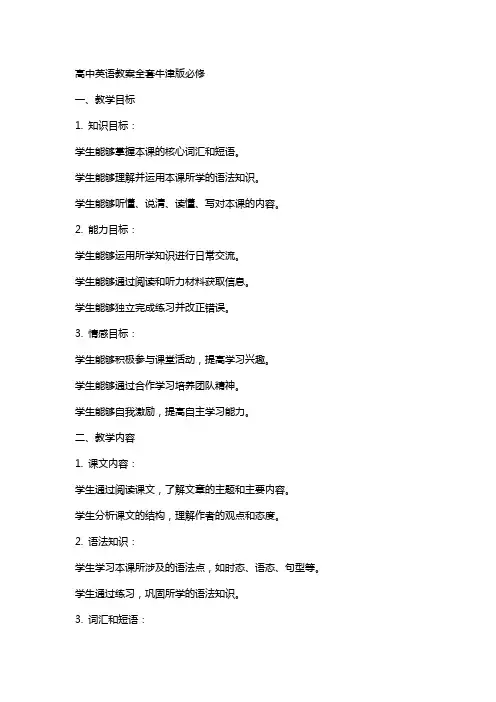
高中英语教案全套牛津版必修一、教学目标1. 知识目标:学生能够掌握本课的核心词汇和短语。
学生能够理解并运用本课所学的语法知识。
学生能够听懂、说清、读懂、写对本课的内容。
2. 能力目标:学生能够运用所学知识进行日常交流。
学生能够通过阅读和听力材料获取信息。
学生能够独立完成练习并改正错误。
3. 情感目标:学生能够积极参与课堂活动,提高学习兴趣。
学生能够通过合作学习培养团队精神。
学生能够自我激励,提高自主学习能力。
二、教学内容1. 课文内容:学生通过阅读课文,了解文章的主题和主要内容。
学生分析课文的结构,理解作者的观点和态度。
2. 语法知识:学生学习本课所涉及的语法点,如时态、语态、句型等。
学生通过练习,巩固所学的语法知识。
3. 词汇和短语:学生学习并掌握本课的核心词汇和短语。
学生通过练习,提高词汇和短语的应用能力。
三、教学过程1. 导入:教师通过与学生互动,引起学生对课文的兴趣。
教师提出问题,引导学生思考课文的主题。
2. 阅读理解:学生阅读课文,理解文章的主要内容和观点。
学生回答教师提出的问题,检验对课文的理解。
3. 语法讲解:教师讲解本课所涉及的语法知识。
学生通过练习,巩固所学的语法知识。
四、课后作业1. 学生完成课后练习,巩固所学知识。
2. 学生通过阅读相关材料,扩展词汇量和知识面。
五、教学评价1. 课堂参与度:观察学生在课堂上的发言和互动情况,评价学生的参与度。
2. 作业完成情况:检查学生课后作业的完成质量,评价学生的学习效果。
3. 测试成绩:通过单元测试或考试,评价学生对知识的掌握程度。
1. 任务型教学法:通过设计各种实际任务,让学生在完成任务的过程中运用所学知识,提高实际运用能力。
2. 交际法:鼓励学生积极参与课堂对话,提高口语表达能力。
3. 情境教学法:创设真实的语言环境,让学生在特定的情境中学习和使用英语。
七、教学资源1. 教材:使用牛津版高中英语教材,为学生提供系统性的学习资源。
2. 多媒体设备:利用投影仪、电脑等设备,展示课件、视频等教学资源。
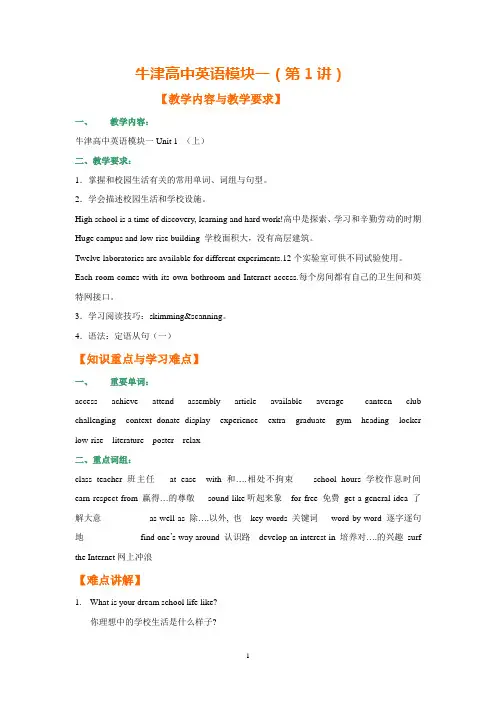
牛津高中英语模块一(第1讲)【教学内容与教学要求】一、教学内容:牛津高中英语模块一Unit 1 (上)二、教学要求:1.掌握和校园生活有关的常用单词、词组与句型。
2.学会描述校园生活和学校设施。
High school is a time of discovery, learning and hard work!高中是探索、学习和辛勤劳动的时期Huge campus and low-rise building 学校面积大,没有高层建筑。
Twelve laboratories are available for different experiments.12个实验室可供不同试验使用。
Each room comes with its own bothroom and Internet access.每个房间都有自己的卫生间和英特网接口。
3.学习阅读技巧:skimming&scanning。
4.语法:定语从句(一)【知识重点与学习难点】一、重要单词:access achieve attend assembly article available average canteen club challenging context donate display experience extra graduate gym heading locker low-rise literature poster relax二、重点词组:class teacher 班主任at ease with 和….相处不拘束school hours学校作息时间earn respect from 赢得…的尊敬sound like听起来象for free 免费get a general idea 了解大意as well as 除….以外, 也key words 关键词word by word 逐字逐句地find one’s way around 认识路develop an interest in 培养对….的兴趣surf the Internet网上冲浪【难点讲解】1.What is your dream school life like?你理想中的学校生活是什么样子?这里dream表示心目中最理想的. 如dream team (梦之队)。
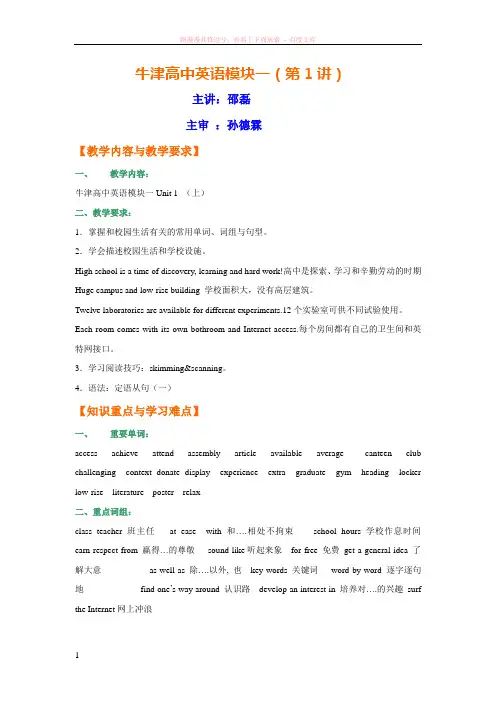
牛津高中英语模块一(第1讲)主讲:邵磊主审:孙德霖【教学内容与教学要求】一、教学内容:牛津高中英语模块一Unit 1 (上)二、教学要求:1.掌握和校园生活有关的常用单词、词组与句型。
2.学会描述校园生活和学校设施。
High school is a time of discovery, learning and hard work!高中是探索、学习和辛勤劳动的时期Huge campus and low-rise building 学校面积大,没有高层建筑。
Twelve laboratories are available for different experiments.12个实验室可供不同试验使用。
Each room comes with its own bothroom and Internet access.每个房间都有自己的卫生间和英特网接口。
3.学习阅读技巧:skimming&scanning。
4.语法:定语从句(一)【知识重点与学习难点】一、重要单词:access achieve attend assembly article available average canteen club challenging context donate display experience extra graduate gym heading locker low-rise literature poster relax二、重点词组:class teacher 班主任at ease with 和….相处不拘束school hours学校作息时间earn respect from 赢得…的尊敬sound like听起来象for free 免费get a general idea 了解大意as well as 除….以外, 也key words 关键词word by word 逐字逐句地find one’s way around 认识路develop an interest in 培养对….的兴趣surf the Internet网上冲浪【难点讲解】1.What is your dream school life like?你理想中的学校生活是什么样子?这里dream表示心目中最理想的. 如dream team (梦之队)。
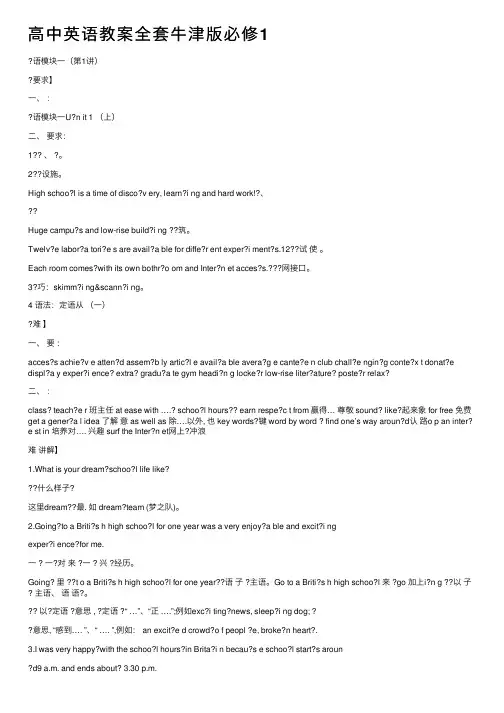
⾼中英语教案全套⽜津版必修1语模块⼀(第1讲)要求】⼀、:语模块⼀U?n it 1 (上)⼆、要求:1?? 、 ?。
2??设施。
High schoo?l is a time of disco?v ery, learn?i ng and hard work!?、Huge campu?s and low-rise build?i ng ??筑。
Twelv?e labor?a tori?e s are avail?a ble for diffe?r ent exper?i ment?s.12??试使。
Each room comes?with its own bothr?o om and Inter?n et acces?s.⽹接⼝。
3?巧:skimm?i ng&scann?i ng。
4 语法:定语从(⼀)难】⼀、要:acces?s achie?v e atten?d assem?b ly artic?l e avail?a ble avera?g e cante?e n club chall?e ngin?g conte?x t donat?e displ?a y exper?i ence? extra? gradu?a te gym headi?n g locke?r low-rise liter?ature? poste?r relax?⼆、:class? teach?e r 班主任 at ease with ….? schoo?l hours?? earn respe?c t from 赢得… 尊敬 sound? like?起来象 for free 免费get a gener?a l idea 了解意 as well as 除….以外, 也 key words?键 word by word ? find one’s way aroun?d认路o p an inter?e st in 培养对…. 兴趣 surf the Inter?n et⽹上?冲浪难讲解】1.What is your dream?schoo?l life like?什么样⼦?这⾥dream??最. 如 dream?team (梦之队)。
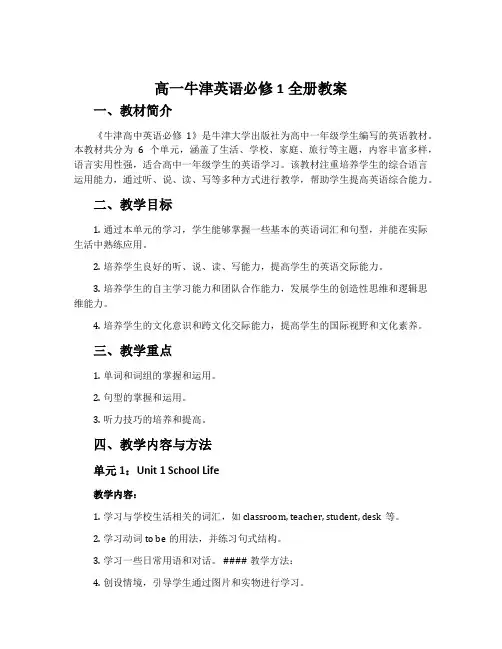
高一牛津英语必修1全册教案一、教材简介《牛津高中英语必修1》是牛津大学出版社为高中一年级学生编写的英语教材。
本教材共分为6个单元,涵盖了生活、学校、家庭、旅行等主题,内容丰富多样,语言实用性强,适合高中一年级学生的英语学习。
该教材注重培养学生的综合语言运用能力,通过听、说、读、写等多种方式进行教学,帮助学生提高英语综合能力。
二、教学目标1.通过本单元的学习,学生能够掌握一些基本的英语词汇和句型,并能在实际生活中熟练应用。
2.培养学生良好的听、说、读、写能力,提高学生的英语交际能力。
3.培养学生的自主学习能力和团队合作能力,发展学生的创造性思维和逻辑思维能力。
4.培养学生的文化意识和跨文化交际能力,提高学生的国际视野和文化素养。
三、教学重点1.单词和词组的掌握和运用。
2.句型的掌握和运用。
3.听力技巧的培养和提高。
四、教学内容与方法单元1:Unit 1 School Life教学内容:1.学习与学校生活相关的词汇,如classroom, teacher, student, desk等。
2.学习动词to be的用法,并练习句式结构。
3.学习一些日常用语和对话。
#### 教学方法:4.创设情境,引导学生通过图片和实物进行学习。
5.利用多媒体资源,辅助教学,激发学生的学习兴趣。
6.进行小组活动,提高学生的合作能力和语言表达能力。
单元2:Unit 2 Family Life教学内容:1.学习与家庭生活相关的词汇,如father, mother, brother, sister等。
2.学习表示“喜欢”和“讨厌”的表达方式,并运用到句子结构中。
3.学习描述家庭成员以及其职业的英语表达方式。
#### 教学方法:4.利用图片和实物,让学生感受到家庭的温馨和幸福。
5.分角色进行对话练习,培养学生的口语表达能力。
6.进行情景模拟活动,让学生在实际情境中运用所学知识。
单元3:Unit 3 Travel and Adventure教学内容:1.学习与旅行和冒险相关的词汇,如mountain, beach, explore, adventure等。
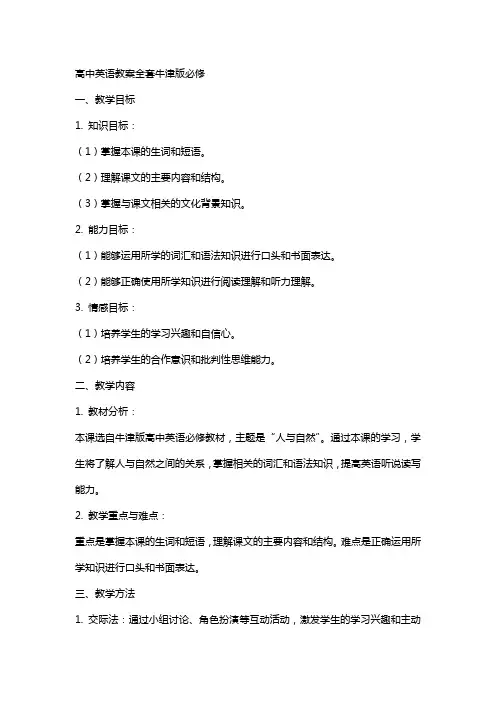
高中英语教案全套牛津版必修一、教学目标1. 知识目标:(1)掌握本课的生词和短语。
(2)理解课文的主要内容和结构。
(3)掌握与课文相关的文化背景知识。
2. 能力目标:(1)能够运用所学的词汇和语法知识进行口头和书面表达。
(2)能够正确使用所学知识进行阅读理解和听力理解。
3. 情感目标:(1)培养学生的学习兴趣和自信心。
(2)培养学生的合作意识和批判性思维能力。
二、教学内容1. 教材分析:本课选自牛津版高中英语必修教材,主题是“人与自然”。
通过本课的学习,学生将了解人与自然之间的关系,掌握相关的词汇和语法知识,提高英语听说读写能力。
2. 教学重点与难点:重点是掌握本课的生词和短语,理解课文的主要内容和结构。
难点是正确运用所学知识进行口头和书面表达。
三、教学方法1. 交际法:通过小组讨论、角色扮演等互动活动,激发学生的学习兴趣和主动性。
2. 任务型教学法:通过完成各种任务,培养学生的实践能力和合作意识。
3. 情境教学法:通过创设真实的情境,提高学生的语言运用能力。
四、教学步骤1. 导入:(1)引导学生回顾上一课的内容。
(2)通过提问,激发学生对人与自然关系的思考。
2. 呈现:(1)展示课文图片,引导学生预测课文内容。
(2)播放课文录音,让学生初步理解课文。
3. 理解:(1)引导学生阅读课文,理解课文的主要内容和结构。
(2)讲解生词和短语,帮助学生巩固知识。
4. 实践:(1)组织学生进行小组讨论,讨论人与自然的关系。
(2)让学生进行角色扮演,运用所学知识进行口头表达。
(2)布置课后作业,巩固所学知识。
五、课后作业1. 抄写本课的生词和短语。
2. 根据课文内容,写一篇短文,描述人与自然的关系。
3. 预习下一课的内容,准备课堂讨论。
六、教学评价1. 形成性评价:(1)课堂参与度:观察学生在课堂上的发言和互动情况,评价学生的参与度和积极性。
(2)作业完成情况:检查学生作业的完成质量,评价学生的学习效果。
2. 终结性评价:(1)单元测试:在学习单元结束后,进行测试,了解学生对知识的掌握程度。
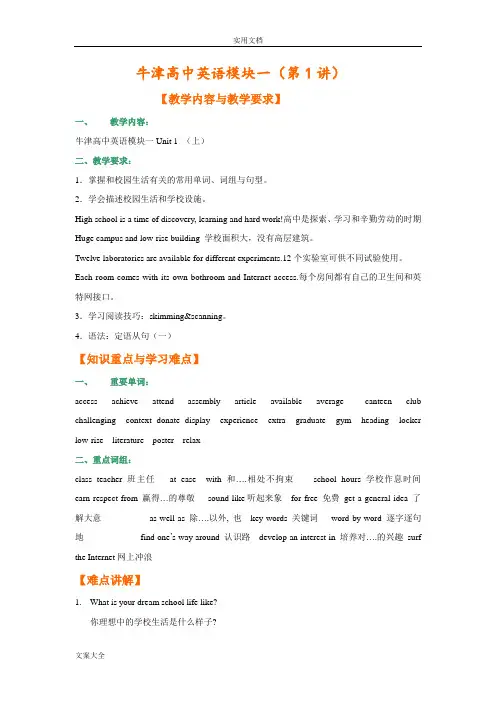
牛津高中英语模块一(第1讲)【教学内容与教学要求】一、教学内容:牛津高中英语模块一Unit 1 (上)二、教学要求:1.掌握和校园生活有关的常用单词、词组与句型。
2.学会描述校园生活和学校设施。
High school is a time of discovery, learning and hard work!高中是探索、学习和辛勤劳动的时期Huge campus and low-rise building 学校面积大,没有高层建筑。
Twelve laboratories are available for different experiments.12个实验室可供不同试验使用。
Each room comes with its own bothroom and Internet access.每个房间都有自己的卫生间和英特网接口。
3.学习阅读技巧:skimming&scanning。
4.语法:定语从句(一)【知识重点与学习难点】一、重要单词:access achieve attend assembly article available average canteen club challenging context donate display experience extra graduate gym heading locker low-rise literature poster relax二、重点词组:class teacher 班主任at ease with 和….相处不拘束school hours学校作息时间earn respect from 赢得…的尊敬sound like听起来象for free 免费get a general idea 了解大意as well as 除….以外, 也key words 关键词word by word 逐字逐句地find one’s way around 认识路develop an interest in 培养对….的兴趣surf the Internet网上冲浪【难点讲解】1.What is your dream school life like?你理想中的学校生活是什么样子?这里dream表示心目中最理想的. 如dream team (梦之队)。
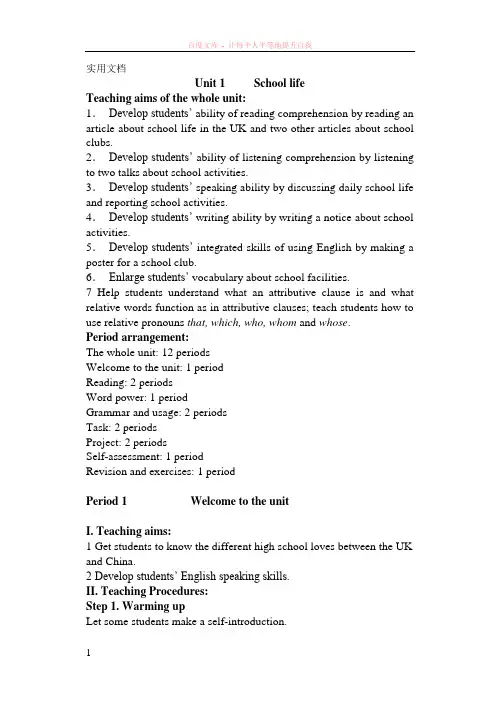
Unit 1 School lifeTeaching aims of the whole unit:1.Develop students’ ability of reading comprehension by reading an article about school life in the UK and two other articles about school clubs.2.Develop students’ ability of listening comprehension by listening to two talks about school activities.3.Develop students’ speaking ability by discussing daily school life and reporting school activities.4.Develop students’ writing ability by writing a notice about school activities.5.Develop students’ integrated skills of using English by making a poster for a school club.6.Enlarge students’ vocabulary about school facilities.7 Help students understand what an attributive clause is and what relative words function as in attributive clauses; teach students how to use relative pronouns that, which, who, whom and whose.Period arrangement:The whole unit: 12 periodsWelcome to the unit: 1 periodReading: 2 periodsWord power: 1 periodGrammar and usage: 2 periodsTask: 2 periodsProject: 2 periodsSelf-assessment: 1 periodRevision and exercises: 1 periodPeriod 1 Welcome to the unitI. Teaching aims:1 Get students to know the different high school loves between the UK and China.2 Develop students’ English speaking skills.II. Teaching Procedures:Step 1. Warming upLet some students make a self-introduction.1. Introduce themselves.2. Say something about their junior high school life.3. Pair work: brain storm:When we are talking about our school life, what will we probably think of?What words or phrases will we use to describe our school life? Step 2 Presentation1.Say the following to students:It’s the beginni ng of the new term. You’ve just finished your junior high and are about to enter a new period in your studies. I am happy to give your lessons and I hope we can be friends.I can see that some of your are eager to know what studying at senior high will be like. Will it be differ4ent from junior high? Well, there are certainly many differences between junior high and senior high, but there are also some things that are the same in every school in China. What about schools in other countries? Do you have different experiences? Are schools all over the world the same? This is the subject of our first unit.2. Ask students to read the instruction and tell them:Here are three pictures that show some aspects of school life in the UK. Please read the instructions, look at the pictures: what's the difference between schools in China and the UK?Step 3 Discussion1 Ask students the following questions to talk about the words in the four pictures:Huge campus and low-rise buildingsWhat does huge mean?What does low-rise mean?What about campus and school buildings in China?(Schools in China usually have a large enough campus to make sure students have enough space to study and play. But most school buildings have at least 3 storeys.)Lockers for every studentDo you know what a locker is?(There are rows of lockers by the classrooms for students to put their bookd, exercise-books and other belongings.)What do you think about locker for students?Do you think that we should have such locker in our school? Why or Why not?Fewer students in each classHow many students are there in our class?Do you know the number of students in a class in the UK?At ease with our teacherWhat can we know from this picture?What does the word ease mean? What do you think the phrase at ease mean?Were you getting on well with the teacher when you were in junior high?What relationship do you want to have with your teachers in senior high?2 Ask students to work in groups to talk about the four pictures and the differences between schools in the UK and China. Then ask several students to report their discussion to the whole class.aspects In the UK In ChinaHuge campus and low-rise buildings We can see hugecampus andlow-rise buildings.It is the biggestdifference fromschools in ChinaSchools in China usually have alarge enough campus to make surestudents have enough space tostudy and play in.But most school buildings aretaller, at least three storeys.Lockers for every student There are rows oflockers by theclassrooms forstudents to put theirstationary, books,exercise-books andother belongings.Students bring what they need forlessons to school and then take itall back home after school. Mostschools in china do not haveequipment in the classroom.Fewer students in each class There are fewerstudents in a class,no more than 30 perThere are usually more students inhigh school, perhaps 40 to 50 perclass. Recently some schools areclass. beginning to limit the number ofstudents in each class.At ease with our teacher Students have aclose relationshipwith their teachers.They feel at easeand comfortablewith them.It is similar in china. Nowadays,lots of teachers and students haveestablished a good relationshipwith each other. They respect eachother and work to gain a betterunderstanding of each other.3. Ask students to discuss the three questions in pairs, and them ask some of them to report their answers to the questions to the whole class.What is your dream school life like?What kind of school activities do you enjoy?What do you think of your life here in the new school?Step 4 Summary and HomeworkToday we’ve mainly talked about the differences between the high school lives in the UK and in China. After class you should:1) Recall all the new words and expressions that we learn in this lesson.2) Find more about any other differences between the high school lives in the UK and in China, either by surf the Internet or by reading some articles in newspapers or magazines.3) Preview the following part: reading (page 2 to page 4).Period 2 Reading (1) School life in the UKTeaching aims:1. Get students to know what school life is like in a high school in the UK.2. Develop students’ ability of reading comprehension through:1)skimming and scanning.2)Guessing the meanings of some new words from the context3. To learn some expressions about school life.Teaching procedures:Step 1 Lead-in and PresentationSay the following to the students:Yesterday we’ve talked about the differences between the high school lives in the UK and in China. We know well about the high school lives in China, because we are Chinese. But we know a little about the high school lives in the UK. Yeah? Today we are going to read a magazine article which is written by an exchanging student. She has been studying in the UK for one year. Now she gives a clear brief introduction about her school life there.(Bb: School life in the UK) Before we read the article, we are going to learn the reading strategy: skimming and scanning.Please look at page 3: Reading strategy. (Bb the following while learning the reading strategy. )Skimming: to get a general idea of the article, without studying it in detail.Focus on the titles, headings, the first and last sentences or paragraphs, charts and pictures …scanning: to find certain information in an article quickly.Look for key words and phrases, dates and numbers, etc.Step 2. Reading1. Skimming:Question: How does Wei Hua feel about her life in the UK?2. Scanning:1)Ask students to go through the three questions in part A and makesure that each of them know the meaning of each question.(AWoodwork class is a class in which students make somethingfrom wood.)Ask students to read the passage as quickly as possible and try to find answers to the three questions. Remind students only tofocus on and identify the most important information.2)Ask student to reread the passage and complete Part C1individually. Then ask some of them to give the answers to thequestions in Part C13)Ask students to finish Part C2 individually. Then get somestudents to share their answers with the whole class. Ask them to say the true sentences to correct the false ones.3 GuessingAsk students to finish Part D individually. Tell them not to look up the meanings of the words from the wordlists in the textbook. Let themguess the meanings from the context. Then check the answers with the whole class.Step 3 New Words in this UnitStudy the new words appears from page2 to page 5 (from attend to immediately) at page 68.Step 4. Homework.1. Complete part E on page 5.2. Read the two articles in reading on pages 82 and 83 in wb and answers the questions below them.3. Learn all the new words we learned today by heart.Period 3 Reading (2) School life in the UKTeaching aims:1 Help students become more familiar with the article.2 Develop students’ ability of reading comprehension by finding out what topics are covered in the article.3 Develop students’ ability of speaking by discussing the subjects they like in school.Teaching Procedures:Step 1. Revision:Check the homework:1)Have a dictation to go over the words learned last period.2)Check the answers in reading on pages 82 and 83 in wb.3)Ask some students to read the article in Part E to check whetherthey have used the suitable word in each blank.Step 2 Reading1) Ask some students to read the article aloud paragraph by paragraph. Ask other students to find out what topics are covered in it.School hoursSchool assemblyTeachersClass sizeDifferent classes in different classroomsHomeworkSubjects and favourite subjectsWhat to do at lunchtimeBritish food3)Ask students to point out the different high school lives in the UKand in China in these topics.Step 3 DiscussionLet students look at Part F together and discuss the questions in Part F in Pairs. Then get some pairs to act out their discussion in class.Step 4 Language focus1 Ask students to find out the following words, phrases and sentences in the article. Then give some explanations.Words:a)as (since, because, for)b)attend (join, join in, take part in)c)prepared)experiencee)respectf)exciting, excitedg)dropPhrases:a)for freeb)be happy withc)used to do sth.; be/get used to do sth.; be/get used to doing sth.d)the way to do; the way of doing; the way + Attributive Clausee)at the end of; in the end; by the end off)as … asSentences:a)Going to a British school for one year has been a very enjoyableand exciting experience for me.b)I do like eating.c)We also had different students in some class, so it was difficult toremember all the faces and names.2 Ask students to put the following sentences into English in their exercise-books.1) Jim 加入了我们的讨论之列。
⽜津英语⾼⼀必修1教案全套⽜津⾼中英语模块⼀(第 1 讲)⽜津⾼中英语模块⼀(第五讲)主讲教师:邵磊主审:孙德霖【教学内容与教学要求】⼀、教学内容:⽜津⾼中英语模块⼀Unit 3(上)⼆、教学要求:1.学会谈论健康、锻炼,描述问题。
2.学习e-mail 的写作。
3.语法:⾮限制性定语从句、反意疑问句。
【知识重点与学习难点】⼀、重要单词:stay(系动词:保持),slim, figure, weight, ashamed, recover, failure, contain, chemical, seldom, damage, attractive, touching, embarrassed, pressure, overweight, diet, properly, skinny, con sider, fit(强健的),pill, appeara nee, especially, amazed, archery, squash, aerobics有氧运动),triathlon(铁⼈三项),category, partial(咅E分的),response, purpose, confirmation, actually, recognize.⼆、重点词组:work out 锻炼、训练,go on diets/a diet实⾏节⾷,in secret私⾃,side effect副作⽤,put on weight 体重增⼒⼙,lose weight 减肥,be ashamed of对….感⾄U羞耻,an exact match for和….完全匹配的…,follow one 'advice听从某⼈的建议,sou nd fun 听起来象是件有趣的事,team sport团队运动,build up增强,regret doing sth后悔做了某事, risk doing sth 冒做某事的风险.三、【语法术语】non-restrictive attributive clause ⾮限制性定语从句, question tag 反意疑问句, positive statement 肯定的陈述句, negative statement 否定的陈述句, personal pronoun ⼈称代词,auxiliary verb 助动词,model verb 情态动词,imperative clause 祈使句.【难点讲解】1. What do you do to keep yourself looking good and feeling go?od你是怎样保持⾃⼰良好的外在形象和健康的⾝体状况的?询问别⼈怎样做某事的可以⽤“ how do you…..?”也可以⽤“ what do you do to….?”例如:How did you make the baby stop crying?What did you do to make the baby stop crying?Keep yourself look ing good and feeli ng good 是⼀个“动 + 宾语+ 补语”结构,现在分词短语looking good and feeling good作宾补。
牛津高一英语必修1全套教案牛津高一英语必修1全套教案牛津高中英语模块一(第1讲)【教学内容与教学要求】一、教学内容:牛津高中英语模块一Unit 1 (上)二、教学要求:1.掌握和校园生活有关的常用单词、词组与句型。
2.学会描述校园生活和学校设施。
High shl is a tie f disver, learning and hard r!高中是探索、学习和辛勤劳动的时期Huge apus and l-rise building 学校面积大,没有高层建筑。
Telve labratries are available fr different experients12个实验室可供不同试验使用。
Eah r es ith its n bthr and Internet aess每个房间都有自己的卫生间和英特网接口。
3.学习阅读技巧:siing&apsanning。
4.语法:定语从句(一)【知识重点与学习难点】一、重要单词:aess ahieve attend assebl artile available average anteen lub hallenging ntext dnate displa experiene extra graduate g heading ler l-rise literaturepster relax二、重点词组:lass teaher 班主任at ease ith 和…相处不拘束shl hurs学校作息时间earn respet fr 赢得…的尊敬sund lie听起象fr free 免费get a general idea 了解大意as ell as 除…以外, 也e rds 关键词rd b rd 逐字逐句地find ne’s a arund 认识路develp an interest in 培养对…的兴趣surf the Internet网上冲浪【难点讲解】1hat is ur drea shl life lie?你理想中的学校生活是什么样子?这里drea 表示心目中最理想的如drea tea (梦之队)。
牛津版高一英语必修1全套教案1. Introduction (介绍)本文档为牛津版高一英语必修1全套教案,旨在帮助教师更好地教授这门课程。
本教案按照教材单元结构编排,包括每个单元的主要话题和语言技能目标,以及教学策略和教学活动建议。
2. Unit 1 Friendship (友谊)2.1 Topic (话题)本单元的主题为友谊,学生将学会如何表达对朋友的欣赏和感激之情,并探讨友谊在人生中的重要性。
2.2 Language skills (语言技能)•提高听力技能,能听懂有关朋友的讨论并发表自己的看法。
•提高口语技能,能准确表达自己对朋友的看法和感激之情。
•提高阅读技能,掌握有关友谊的词汇和短语,以及阅读有关朋友的文章并做出回答。
•提高写作技能,能写一篇有关朋友的短文或书信。
2.3 Teaching strategies (教学策略)为了达到教学目标并顺利完成教学任务,本单元教学应采取以下策略:•提供足够的听说机会,鼓励学生在班级里交流,增加对英语的自信心。
•鼓励学生动手实践,引导他们积极参与活动,提高语言实际运用能力。
•提供真实相关的材料,让学生学习与生活相关的英语,提高学生的兴趣和参与度。
•多元化教学法,如小组讨论、角色扮演、情景编写,提高教学效果。
2.4 Teaching activities (教学活动)1.口语训练 (Speaking Practice)•让学生分组,讨论以下问题:你最好的朋友是谁?你们相遇多久了?你们的共同爱好是什么?你觉得你们的友谊最重要的是什么?•老师可以举例介绍自己的最好的朋友,并与学生分享。
随后,学生练习如何表达自己的看法和感激之情。
•角色扮演:学生分角色,模拟两个朋友相遇的情景,展示他们的探讨过程。
2.听力训练 (Listening Practice)•播放一段与朋友相关的记录,并让学生回答以下问题:记录的主题是什么?有多少个人参与讨论?他们的想法是什么?•展示一段对朋友的感恩视频,让学生听完后讨论其中的感情魅力,分享自己的感受。
牛津高中英语模块一(第1讲)【教学内容与教学要求】一、教学内容:牛津高中英语模块一Unit 1 (上)二、教学要求:1.掌握和校园生活有关的常用单词、词组与句型。
2.学会描述校园生活和学校设施。
High school is a time of discovery, learning and hard work!高中是探索、学习和辛勤劳动的时期Huge campus and low-rise building 学校面积大,没有高层建筑。
Twelve laboratories are available for different experiments.12个实验室可供不同试验使用。
Each room comes with its own bothroom and Internet access.每个房间都有自己的卫生间和英特网接口。
3.学习阅读技巧:skimming&scanning。
4.语法:定语从句(一)【知识重点与学习难点】一、重要单词:access achieve attend assembly article available average canteen club challenging context donate display experience extra graduate gym heading locker low-rise literature poster relax二、重点词组:class teacher 班主任at ease with 和….相处不拘束school hours学校作息时间earn respect from 赢得…的尊敬sound like听起来象for free 免费get a general idea 了解大意as well as 除….以外, 也key words 关键词word by word 逐字逐句地find one’s way around 认识路develop an interest in 培养对….的兴趣surf the Internet网上冲浪【难点讲解】1.What is your dream school life like?你理想中的学校生活是什么样子?这里dream表示心目中最理想的. 如dream team (梦之队)。
牛津高一英语必修1全套教案牛津高中英语模块一(第1讲)【教学内容与教学要求】一、教学内容:牛津高中英语模块一Unit 1 (上)二、教学要求:1.掌握和校园生活有关的常用单词、词组与句型。
2.学会描述校园生活和学校设施。
High shl is a tie f disver, learning and hard r!高中是探索、学习和辛勤劳动的时期Huge apus and l-rise building 学校面积大,没有高层建筑。
Telve labratries are available fr different experients12个实验室可供不同试验使用。
Eah r es ith its n bthr and Internet aess每个房间都有自己的卫生间和英特网接口。
3.学习阅读技巧:siing≈sanning。
4.语法:定语从句(一)【知识重点与学习难点】一、重要单词:aess ahieve attend assebl artile available average anteen lub hallenging ntext dnate displa experiene extra graduate g heading ler l-rise literaturepster relax二、重点词组:lass teaher 班主任at ease ith 和…相处不拘束shl hurs学校作息时间earn respet fr 赢得…的尊敬sund lie听起象fr free 免费get a general idea 了解大意as ell as 除…以外, 也e rds 关键词rd b rd 逐字逐句地find ne’s a arund 认识路develp an interest in 培养对…的兴趣surf the Internet网上冲浪【难点讲解】1hat is ur drea shl life lie?你理想中的学校生活是什么样子?这里drea 表示心目中最理想的如drea tea (梦之队)。
2Ging t a British high shl fr ne ear as a ver enable and exiting experiene fr e去一所英国中学读书一年对我说是一次令人愉快和兴奋的经历。
Ging 在本句里作动名词,它和后面的t a British high shl fr ne ear构成动名词短语作句子的主语。
G t a British high shl本是个动词词组,在g 后面加上ing 后,它就具备名词的特性可以在句子中充当主语、宾语或表语。
动词的现在分词和过去分词都可以作定语,但所表达的意思不同, 现在分词作定语常表示“令人…”、“正在…”;例如exiting nes, sleeping dg; 过去分词则有被动或完成的意思,常表示“感到…的”、“被…的”,例如:an exited rd f peple, bren heart3I as ver happ ith the shl hurs in Britain beause shl starts arund 9 a and ends abut 330 p我对英国学校的作息时间很满意因为学校大约上午9点开始上,下午3点半左右放学。
Be happ ith=be pleased ith, arund=abut。
4This eans I uld get up an hur later than usual as shls in hina begin befre 8 a这意味着我可以晚一小时起床,因为在中国学校8点钟上。
as adv同样地, 被看作, 象prep当做n与一样, 当之时, 象, 因为本单元多次出现as, 用法各不相同,应注意比较。
另外as 还可以构成一些常用词组:as if就好像, as far as就…而言, s as t以便于, as fr至于, suh as例如,等等。
ean: 意味着, 后面通常加名词或宾语从句。
例如:The atta f Pear Harbr eant a delaratin f ar ith the United StatesThe raise f salar eans that I an send daughter t a better shlHe als tld us that the best a t earn respet fr the shl as t r hard and ahieve high grades他还告诉我们赢得学校尊敬的最好方法是努力学习并取得好成绩。
The best a t d sth is t…结构用表达做某事的最好方法是…, 例如:The best a t learn English is t use it as ften as pssible6I fund the her as nt as heav as hat I used t get in ld shl, but it as a bit hallenging fr e at first beause all the her as in English我发现这儿的家庭作业没有我原学校的多,但一开始对我有些挑战性,因为所有作业都是英语的。
As…as, 中间加形容词或副词,一般要连接两个相同的句子成分, 请比较下面两句话:u hate hi as uh as I (=u hate hi as uh as I hate hi)u hate hi as uh as e(=u hate hi as uh as u hate e)Used t 过去常常, 隐含的意思是现在的情况已经不同。
例如:She used t stud ver hard ( She des nt stud s hard an re)Used t 的否定形式是usedn’t t/ didn’t use t注意:be used t sth/ding 表示习惯于…7ing as reall fun as I learnt h t bu, prepare and fd当我学着怎样买菜、洗菜、烧饭时,烹饪真的是一有趣的事。
fun是名词,有趣的事情, 副词reall并非修饰它,而是修饰前面的be动词as试比较: He is reall a funn gu 和He is a reall funn gu这两句意思虽然相同, 但reall修饰的对象不同,因此说话的侧重点也不同。
8I d lie eating desserts after eals as u entined in ur artile就像你在中提到的那样,我的确喜欢在饭后吃甜食。
D、did在陈述句中,用在动词前表示强调,可译作的确、确实。
9Upn finishing his studies, he started travelling in hina完成学业之后,他开始在中国旅行。
介词upn/ n加ding相当于带as sn as 的时间状语从句。
Upn finishing his stud=As sn as he finished his stud10Frer student return fr hina一位校友重中国归frer, past, ld 虽然都和过去有关,但侧重点不同。
frer:“过去曾经是的、前任…”, past: “过去的” ld“老的、从前的”。
例如: frer president 前总统,past experiene以往的经验,ld shl我的母校。
11earn, ahieve和gain这三个单词的基本意思都是“get”但含义不尽相同, earn :get as the reard f r(挣,得到…作为工作的回报), ahieve :get hat u ant b effrt(成就,通过努力达到某个目标), gain和“get”的用法最接近,它对得到的方法和内容都没有具体要求。
常见搭配:earn ne/ a living/ ne’s respet/ ne’s bread, ahieve a gal/ suess/ purpse/ high grade, gain experiene/ eight/ an advantage ver/ tie/ the upper hand( 占上风)/ grund(取得进步)【语法】定语从句(1)用说明主句中某一名词或代词(有时也可说明整个主句或主句中一部分)而起定语作用的句子叫作定语从句。
定语从句的作用和作定语的形容词、介词词组、分词词组相似,有时可以相互转换,例如:金发女孩可译作a blnde girl ,a girl ith blnde hair或a girl h has blnde hair。
定语从句通常由关系代词that/ hih/ h/ h/ hih/ as或关系副词hen/ here/ h 引导,这些词既指代主句中要说明的名词或代词, 又充当从句中的某个句子成分。
请看例句:1T is the nl persn h an eep a l head in tie f risis(h指代主句中的先行词persn,在从句中作主语)2T is the nl friend h(或h) I an rel n (指代friend,在从句中作宾语, 所以常用代词h的宾格形式)3hina is n lnger the ea natin that she used t be (关系代词that指代ea natin,在从句中作表语)4The shl hse flr spae is ver liited an’t tae in ne re student (关系代词hse 指代the shl’s ,从句中作flr spae的定语)I lie t g t the g here I an have a r-ut after sitting fr a da (关系副词here指代主句中的地点状语g 在从句中作状语)【阅读技巧】Siing ≈ SanningSiing略读,si原意是轻轻掠过表面,作为阅读技巧是指通过浏览标题,主题句,插图和图表等方法了解的大意。
San, 本意是扫描,这里指用眼光快速扫视书报等材料寻找我们想要的信息。
他们的区别在于Siing是为了了解的大意,而Sanning是为了寻找某些具体信息。
Siing ≈ Sanning都是快速阅读的重要策略,也是信息时代我们必备的技能。
尤其是在阅读英语时,注重练习Siing ≈ Sanning可以帮助克服逐字逐句的阅读习惯(如finger-pint reading, lip reading),提高阅读速度。